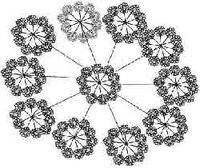Template:Churche

.
Churche
Wycliffe took “churche” from the old English “kirke” which is often attributed to a pagan temple in earlier times. He always translated ekklesia “churche” even when it was used to describe a governmental assembly in Ephesus. In 1526 William Tyndale, and in 1535 Myles Coverdale translated ekklesia as “congregation”. Tyndale only used the word church in Acts 19:37 in reference to that pagan Temple of Diana when he was translating the word hierosulos, robbers of churches. [1]
To understand what a Church is and is not It might be useful to understand that the Temple of Diana was also a Church, one of many Temples that provided a means for the practice of Public religion and it was a bank?
But even more important why were Christians accused of robbing it while many other Romans and Greeks were Investing in Diana?
Anglo-Saxon 'circe', a small church, with 'circol', a circle. It is "Kirche," in England, it is the word "Circe" and in most English versions as a rendering of the Greek word ekklesia. Before that Circe was a goddess of sorcery (pharmakeia) who was skilled in the magic of transmutation, illusion, and necromancy. And her name is derived from the Greek verb kirkoô meaning "to secure with rings" or "hoop around"--a reference to the binding power of magic.
Religious gatherings were often forming circles. The Druids, Celts, and Saxons all met in circles and often marked those areas with a circle of stones. Before Temples were buildings they were areas to safely meet which included sanctuary. At least twenty-eight of these ancient circles can be found in the area of Yorkshire alone. Many of the early Churches were built from some of the stones which had previously marked those sacred circles. Many people still called these buildings circe in Old EnglishKirk or kirk in Scottish when Wycliffe was translating the scriptures from the Greek into English.
- "the derivation of the word 'church' is uncertain. It is found in the Teutonic and Slavonic languages and answers to the derivatives of ekklesia, which are naturally found in the romance languages and by foreign importation elsewhere. The word is generally said to be derived from the Greek kyriakos, meaning the lord's house. But the derivation has been too hastily assumed. It is probably associated with the Scottish kirk, the Latin circus/circulous, the Greek klukos, because the congregations were gathered in circles."[2]
One Ring to bring them all and in the darkness bind them[3]
God has always desired to set the people free from sin like the covetous practices which makes the people merchandise to the Fathers of the earth like Cain, Nimrod, Pharaoh, and Caesar.
Their offer of benefits and Free bread like Food Stamps, Social Security and welfare all provided through forced contributions not only makes the word of God to no effect they also are a snare and a trap.
- Psalms 69:22 Let their table become a snare before them: and that which should have been for their welfare, let it become a trap.
- Romans 11:9 And David saith, Let their table be made a snare, and a trap, and a stumblingblock, and a recompence unto them:
Our desire to rule over our neighbor, to live at the expense of our neighbor, to extract security and benefits from others at the point of the sword brings us under the sword. If we are willing to bite one another we will be devoured.
The Modern Christian's imagination is often steeped in a distorted view of the Early Church. They have many ideas about Religion but none of them include "Pure Religion unspotted by the world". They have essentially made Christianity something it was never meant to be. They claim they want to get back to the roots of the early Christians but they hesitate to find out what the early Church was actually doing.